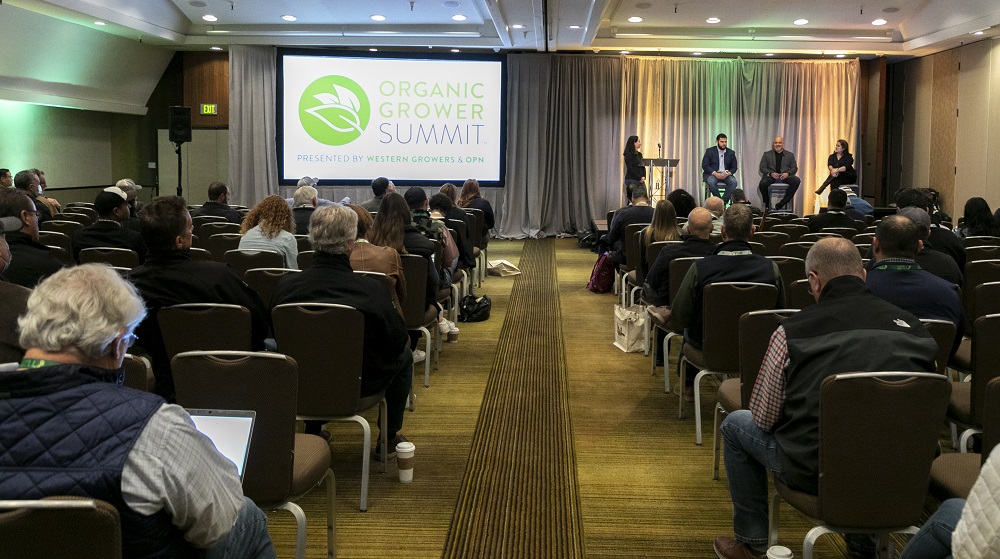Sales of organic produce to Mexican consumers are on the rise, but Mexican organic standards and labeling requirements can be challenging for growers to navigate.

Moderator Maria Barajas (CCOF) and panelists Joshua Tamayo (Taylor Farms), Ed Morales (JV Smith Companies/Promotora Agricola El Toro), and Daniela Robles (Grupo Alta)
A trio of speakers operating in Mexico shared their insights at the recent Organic Grower Summit in a session moderated by Maria Barajas, who is Spanish services supervisor for CCOF’s certification services. One of the big takeaways from the hour-long discussion is that officials in Mexico are every bit as diligent as their US counterparts in protecting the integrity of organic production. In fact, all three speakers noted that often the rules on labeling, product, and use are stricter in Mexico.
Daniela Robles, who works for grape and watermelon producer Grupo Alta, based in Sonora, Mexico, said the company sells its organic products to both the United States and the Mexican market. She showed photos of the much more cumbersome and detailed label that must be used for Mexico compared to the brief label for US consumption. Mexico officials tend to change the label requirement every year, she said, and it is very important that US producers wanting to sell organics into Mexico be very familiar with those rules. “Requirements of Mexican labeling are very difficult to manage,” Robles said.

Daniela Robles, Agricultural Engineer, Grupo Alta
Barajas said shippers should get their labels approved before printing, and they should only print what they are going to be using that same year.
Mexico officials tend to change the label requirement every year, Robles said, and it is very important that US producers wanting to sell organics into Mexico be very familiar with those rules.
Joshua Tamayo, who is the food safety and quality assurance manager for Taylor Farms’ processing facility in Mexicali, revealed that Mexico’s strict labeling law has altered the company’s planned introduction of its very popular Organic Avocado Ranch Chopped Kit. The kit includes cheese and a dressing that use binding agents, which don’t allow it to be labeled “organic” in Mexico. Taylor Farms has instead introduced it as a non-organic product in Mexico, though it contains the same ingredients as the kit that is sold as organic in the US.

Joshua Tamayo, Food Safety and Quality Assurance Manager, Taylor Farms
That experience, Tamayo said, is a great illustration of both the opportunities and hurdles involved in introducing organic value-added items to Mexico. The country’s labeling laws are designed to get Mexicans to eat a healthier diet. Products high in sugar, sodium, and calories must be labeled as such, Tamayo said. This has created a growing awareness of this nutritional information among consumers and is helping to drive increased consumption of fruits and vegetables, including organic options.
In fact, Tamayo said there are so few value-added options that the company has seen great growth in the two valued-added organic items—spring mix and spinach—it sells to Costco Mexico.
 Moderator Maria Barajas (CCOF) and panelists Joshua Tamayo (Taylor Farms), Ed Morales (JV Smith Companies/Promotora Agricola El Toro), and Daniela Robles (Grupo Alta)
Moderator Maria Barajas (CCOF) and panelists Joshua Tamayo (Taylor Farms), Ed Morales (JV Smith Companies/Promotora Agricola El Toro), and Daniela Robles (Grupo Alta)
Since its introduction almost two years ago, organic spring mix has seen an 81 percent increase in sales while organic spinach has climbed 22 percent. “The Organic Avocado Ranch Chopped salad would have been a hit,” Tamayo said, lamenting that the Mexican rules have thus far prevented the introduction of that as an organic option.
The Taylor Farms Mexicali facility is currently producing 600,000 cases per week for the Mexican and US market, with 40 percent of the finished product being organic. During the winter, the raw produce is sourced from Mexico, but during the summer, it mostly comes from the Salinas Valley crossing into Mexico at the San Luis Port of Entry in Arizona.
“The Organic Avocado Ranch Chopped salad would have been a hit,” Tamayo said, lamenting that the Mexican rules have thus far prevented the introduction of that as an organic option.
Getting organic product through the San Luis Port of Entry is often challenging, Tamayo said, because of the lack of equivalency between the standards for US production and those in Mexico. While the standards are close, there are products that are allowed for use by the US National Organic Program standards but don’t qualify as organic in Mexico. The main issue is sodium nitrate, which Mexico does not allow.
Tamayo said another major issue involved in importing raw or finished product into Mexico is that the border inspectors and the federal government are not always on the same page.

“Any changes that happen [to the regulations], happen in Central Mexico [at the federal level], and sometimes it takes time to get the information relayed to the border,” Tamayo said.
Companies planning to ship into Mexico should “get to know your agent at your point of entry,” he said, noting that will make it easier to get a resolution when problems occur, which he indicated is a common occurrence.
“Any changes that happen [to the regulations], happen in Central Mexico [at the federal level], and sometimes it takes time to get the information relayed to the border.” – Joshua Tamayo
Agreeing with that assessment was panelist Ed Morales, food safety and organic certification director for JV Smith Companies' Mexicali farm called Agricola El Toro, which has 6,500 certified acres of production and grows many different organic vegetables for several shippers.

Ed Morales, Food Safety and Organic Certification Director, JV Smith Companies/Promotora Agricola El Toro
Morales, who grew up in the Salinas Valley and is the son of an organic farmer pioneer (Israel Morales), has been working in Mexicali Valley agriculture for 25 years (18 of which have been for JV Smith Companies). He said both organic production and the market for organics are increasing at a healthy clip. More growers are seeing the benefits of organics, and Mexican consumers are becoming more aware and connecting organics with sustainability and social responsibility. He said JV Smith continues to add to its organic acreage every year.
More growers are seeing the benefits of organics, and Mexican consumers are becoming more aware and connecting organics with sustainability and social responsibility.
Robles agreed that equivalency between US and Mexican organic standards (and Canadian too) is very important for her company. Grupo Alta grows organic grapes for both markets, and she said segregating the production as well as maintaining multiple sets of labels is a laborious and time-consuming task.
A full recap of the educational sessions and keynote presentation are available HERE.






